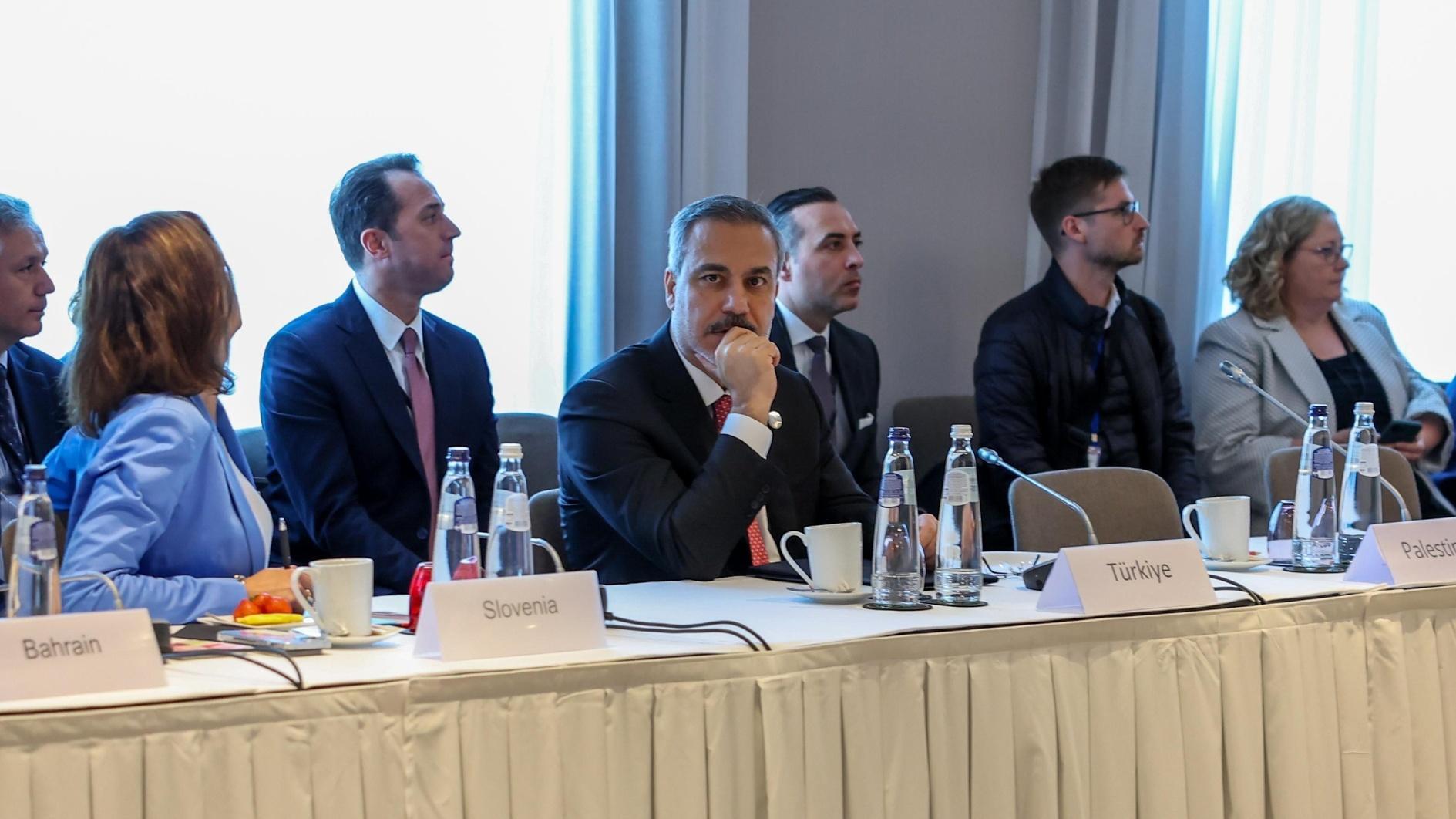
Foreign Minister Hakan Fidan has stated that the international community's support for the Palestinian cause is growing and that more countries should recognize Palestine as a free state and act accordingly.
“The most important thing is to give Palestine not only support but also freedom and a state with sovereignty,” Fidan said in Brussels, where he and the Gaza contact group visited to hold talks with the European Union on the Palestinian issue, underscoring the importance of its freedom.
According to Fidan, Türkiye's main message was that when Palestine takes control of its own state and initiative, it will undoubtedly boost its own economy. However, leaving the state as a mere administration, depriving it of sovereignty and economic initiative, and making it a political entity that solely relies on aid does not benefit the Palestinian people or the region.
Fidan said that postponing the recognition of Palestine does not solve the problem but rather gives Israel more time.
According to diplomatic sources, he delivered the message at the International Partners Meeting and a meeting on the implementation of the two-state solution.
“Right now, the world knows the problem in Gaza and the problem in Ramallah,” Fidan said, and asked the question, "After accepting the two-state solution, how do we move on from there?"
"We sought the answer to this question during discussions with the participating countries in the meetings," he said.
"The fact that Spain, Norway, Ireland, and Slovenia have recognized Palestine as a state, thus bringing the number of states recognizing Palestine to 150, is a very important point," he stated.
He acknowledged all efforts made for Palestine since the Oslo Accords, but emphasized that without insisting on a different approach, no different outcome can be expected.
Fidan noted that since Oslo, the international community has preferred to refer to Palestine as a "authority" rather than a "government," indicating an imbalance that perpetuates Israel's occupation.
Fidan further stated that Palestine must be recognized by the United Nations Security Council in every way and definitively, adding, "It is extremely important that a structure recognized as a state by 150 countries be recognized immediately by the U.N. Security Council."
Fidan emphasized that Palestine is under occupation and cannot exercise economic and political freedom, but nevertheless, it is important to treat Palestine as a full state and to protect it, even if symbolically and sometimes practically.
"The 1967 borders must never fade from people's memories or official documents. The Netahyahu administration is trying to convince the world that the 1967 borders have disappeared and that there is only Israel," Fidan stated.
"After Oct. 7, the world said "stop" to these deceptions, propaganda, and lies. There is currently a collective, systematic, gradual, and qualified uprising."
"As Türkiye and our allies, we are striving to carry out this uprising in a professional and systematic manner," he concluded.
Fidan also informed that the Contact Group, established by prominent Islamic nations including Türkiye, Egypt, Saudi Arabia, Qatar, Jordan and others, will travel to Spain to congratulate Madrid for recognizing Palestine as a state.
“There will be an opportunity for us to give a meaningful message for the Palestinian process of becoming a state,” he stated.
The push for a Palestinian state gained momentum last week when EU countries Ireland and Spain — and ally Norway — said they'd recognize the State of Palestine.
But the move also underscored divisions within the 27-nation EU, which has struggled to reach a unified position on the war in Gaza.
One area where the EU could play a practical role on the ground after the war is the possible monitoring of the Rafah border crossing from Gaza to Egypt.
EU foreign policy chief Josep Borrell said EU ministers would discuss relaunching a mission suspended back in 2007 to monitor the crossing after calls for it to do so from regional players.
The war in Gaza was sparked by Hamas's Oct. 7 attack on southern Israel that resulted in the deaths of more than 1,170 people, mostly civilians, according to Israeli official figures.
Hamas also took 252 hostages, 121 of whom remain in Gaza, including 37 the army says are dead.
Israel's retaliatory offensive has killed at least 35,984 people in Gaza, mostly civilians, according to the Hamas-run territory's health ministry.